Related Research Articles

Liberia, officially the Republic of Liberia, is a country on the West African coast. It is bordered by Sierra Leone to its northwest, Guinea to its north, Ivory Coast to its east, and the Atlantic Ocean to its south and southwest. It has a population of around 5 million and covers an area of 43,000 square miles (111,369 km2). The country's official language is English; however, over 20 indigenous languages are spoken, reflecting the country's ethnic and cultural diversity. The capital and largest city is Monrovia.

Liberia is a country in West Africa founded by free people of color from the United States. The emigration of African Americans, both freeborn and recently emancipated, was funded and organized by the American Colonization Society (ACS). The mortality rate of these settlers was the highest among settlements reported with modern recordkeeping. Of the 4,571 emigrants who arrived in Liberia between 1820 and 1843, only 1,819 survived (39.8%).

The Politics of Liberia takes place in a framework of a presidential representative democratic republic modeled on the government of the United States, whereby the President is the head of state and head of government; unlike the United States, however, Liberia is a unitary state as opposed to a federation and has a pluriform multi-party system rather than the two-party system that characterizes US politics. Executive power is exercised by the government. Legislative power is vested in both the government and the two chambers of the legislature.
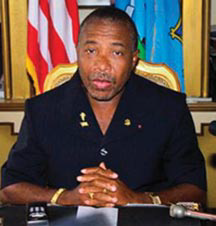
Charles McArthur Ghankay Taylor is a Liberian former politician and convicted war criminal who served as the 22nd president of Liberia from 2 August 1997 until his resignation on 11 August 2003 as a result of the Second Liberian Civil War and growing international pressure.
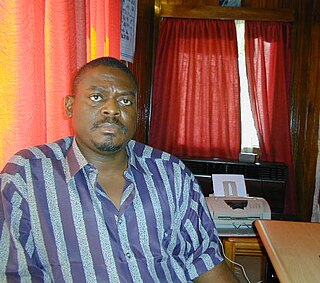
Major Johnny Paul Koroma was a Sierra Leonean military officer who was the head of state of Sierra Leone from May 1997 to February 1998.

The First Liberian Civil War was the first in a series of two civil wars within the West African nation of Liberia. It lasted from 1989 to 1997. President Samuel Doe established a regime in 1980 but totalitarianism and corruption led to unpopularity and the withdrawal of support from the United States by the late 1980s. The National Patriotic Front of Liberia (NPFL) led by Charles Taylor invaded Liberia from the Ivory Coast to overthrow Doe in December 1989 and gained control over most of the country within a year. Doe was captured and executed by the Independent National Patriotic Front of Liberia (INPFL), a splinter faction of the NPFL led by Prince Johnson, in September 1990. The NPFL and INPFL fought each other for control of the capital city, Monrovia and against the Armed Forces of Liberia and pro-Doe United Liberation Movement of Liberia for Democracy. Peace negotiations and foreign involvement led to a ceasefire in 1995 but fighting continued until a peace agreement between the main factions occurred in August 1996. Taylor was elected President of Liberia following the 1997 Liberian general election and entered office in August of the same year.
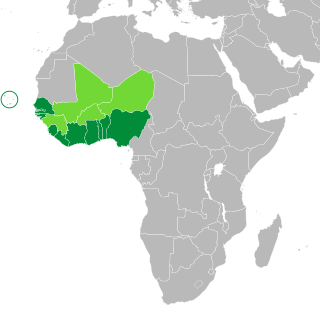
The Economic Community of West African States Monitoring Group (ECOMOG) was a West African multilateral armed force established by the Economic Community of West African States (ECOWAS). ECOMOG was a formal arrangement for separate armies to work together. It was largely supported by personnel and resources of the Nigerian Armed Forces, with sub-battalion strength units contributed by other ECOWAS members — Ghana, Guinea, Sierra Leone, The Gambia, Liberia, Mali, Burkina Faso, Niger, and others.
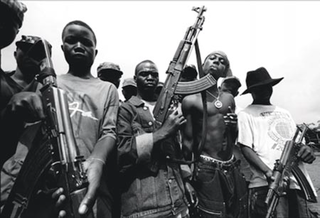
The Second Liberian Civil War was a civil war in the West African nation of Liberia that lasted from 1999 to 2003.
The National Patriotic Front of Liberia (NPFL) was a Liberian rebel group that initiated and participated in the First Liberian Civil War from 24 December 1989 – 2 August 1997. The NPFL emerged out of rising ethnic tensions and civil unrest due to the Liberian government that was characterized by totalitarianism, corruption, and favoritism towards ethnic Krahns. The NPFL invaded Liberia through Ivory Coast’s border with Nimba County in Liberia under the direction of Charles Taylor, a former Liberian politician and guerrilla leader who served as the 22nd president of Liberia from 2 August 1997 until his resignation on 11 August 2003.
Samuel Sam Bockarie, widely known as Mosquito, was a Sierra Leonean politician and army commander who served as a leader of the Revolutionary United Front (RUF). Bockarie was infamous during the Sierra Leone Civil War for his brutal tactics, which included amputation, mutilation, and rape. He earned the nickname "Mosquito" for his ability to attack when his enemies were off-guard, mainly during the night. During his service in the RUF, he befriended future Liberian president Charles Taylor, and RUF commander Foday Sankoh. When Sankoh was imprisoned from March 1997 until April 1999, Bockarie served as commander of the RUF in his place.
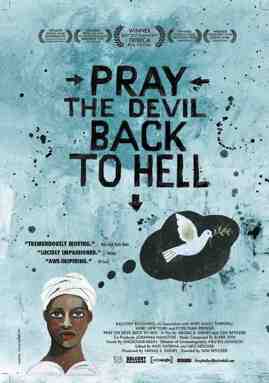
Pray the Devil Back to Hell is a 2008 American documentary film directed by Gini Reticker and produced by Abigail Disney. The film premiered at the 2008 Tribeca Film Festival, where it won the award for Best Documentary. The film had its theatrical release in New York City on November 7, 2008. It had cumulative gross worldwide of $90,066.

Women of Liberia Mass Action for Peace is a peace movement started in 2003 by women in Monrovia, Liberia, Africa, that worked to end the Second Liberian Civil War. Organized by Crystal Roh Gawding and social workers Leymah Gbowee and Comfort Freeman, the movement began despite Liberia having extremely limited civil rights. Thousands of Muslim and Christian women from various classes mobilized their efforts, staged silent nonviolence protests that included a sex strike and the threat of a curse.

United Nations Security Council resolution 1478, adopted unanimously on 6 May 2003, after recalling resolutions 1132 (1997), 1171 (1998), 1306 (2000), 1343 (2001), 1385 (2001), 1395 (2002), 1400 (2002), 1408 (2002), 1458 (2003), 1467 (2003) and others on the situation in Liberia, the Council extended sanctions against the Liberian government for an additional period of twelve months until 7 May 2004 and imposed a ban on imports of its timber for ten months.

Leymah Roberta Gbowee is a Liberian peace activist responsible for leading a women's nonviolent peace movement, Women of Liberia Mass Action for Peace that helped bring an end to the Second Liberian Civil War in 2003. Her efforts to end the war, along with her collaborator Ellen Johnson Sirleaf, helped usher in a period of peace and enabled a free election in 2005 that Sirleaf won. Gbowee and Sirleaf, along with Tawakkul Karman, were awarded the 2011 Nobel Peace Prize "for their non-violent struggle for the safety of women and for women's rights to full participation in peace-building work."
Aya Virginie Touré, born Aya Virginie Kouamé, is a peace activist and politician in Côte d'Ivoire. She became known for organizing women in nonviolent resistance against President Laurent Gbagbo who refused to step down since he lost the presidential election to Alassane Ouattara. Touré worked to mobilize women as the Deputy Director for Ouattara's 2010 Ivorian presidential election. In 2016, she was elected as a deputy in the 72nd circonscription which includes the cities of Guépahouo and Oumé. Since at least 2014, she has been the Executive Director of the Petroci Foundation, the caritative organization of the Ivorian oil and gas company.
Samuel Gbaydee Doe is a conflict, peace, and development professional from Liberia. Doe was a cofounder, with Emmanuel Bombande, of the West Africa Network for Peacebuilding (WANEP), based in Accra, Ghana. This organization focuses on collaborative approaches to conflict prevention and was founded in 1998 in response to the civil wars taking place in West Africa. The organization is known for their work with several regional partners such as the Economic Community of West African States (ECOWAS) and the African Union’s Economic, Social, and Cultural Council (ECOSOCC).
Dorothy Harriet Eugenia Musuleng Cooper was a Liberian educator, politician and the first woman to serve as Foreign Minister in Liberia. She was born at Arthington, Liberia and obtained her B.S. and M.S. from College of West Africa and San Francisco State University respectively. She worked as a school teacher between graduation and high school and matriculation in 1964 in San Francisco in 1964, curriculum development in the Ministry of Education, and principal of Cuttington University College. She was an education minister in Charles Taylor's shadow government from 1990 to 1993 in the National Patriotic Reconstruction Assembly Government
Benjamin Yeaten, widely known by his old radio call sign "50", is a Liberian militia leader and mercenary, who served as the Armed Forces of Liberia's deputy commander and director of the Special Security Service (SSS) during the presidency of Charles Taylor. Notorious for committing several war crimes, Yeaten was one of Taylor's most trusted and loyal followers. He rose to the de facto leader of all of Taylor's armed forces and the second most powerful figure in the government during the Second Liberian Civil War. After the fall of Taylor's regime, he managed to flee his home country, and since then operates covertly in West Africa as commander, recruiter, and military adviser for hire.
Thelma Arimiebi Ekiyor is a Nigerian social entrepreneur and impact investor who has served in authoritative positions within many organizations. Ekiyor has focused primarily on investing in women entrepreneurs. She started her career supporting women in peacebuilding and empowering women and youth through financial independence and educational access. She has experience with projects in more than 22 African countries. Ekiyor worked in post-conflict countries such as Liberia with the peace activist Leymah Gbowee.
Events in the year 2019 in Liberia.
References
- ↑ Dunn, D. Elwood (May 4, 2011). The Annual Messages of the Presidents of Liberia 1848–2010: State of the Nation Addresses to the National Legislature. Walter de Gruyter. ISBN 9783598441691 – via Google Books.
- ↑ Presidential Papers: The first two years of the second administration January 1, 1976 – December 31, 1977. Press Division of the Executive Mansion Liberia. 1977. pp. 100–102.
- ↑ Sub-Saharan Africa Report, Issues 2219–2223. Foreign Broadcast Information Service. 1980. p. 51.
- 1 2 3 Williams, Gabriel I. H. (2002). Liberia: The Heart of Darkness : Accounts of Liberia's Civil War and Its Destabilizing Effects in West Africa. Trafford Publisher. p. 220. ISBN 9781553692942.
- ↑ Huband, Mark (2013). The Liberian Civil War. Routledge. p. 20. ISBN 9781135252144.
- ↑ "The Usual Suspects: Liberia's Weapons and Mercenaries in Côte d'Ivoire and Sierra Leone: Why it's Still Possible, How it Works and How to Break the Trend" (PDF). Global Witness. March 2003. Retrieved February 11, 2017.
- ↑ Sesay, Alpha (May 15, 2008). "Summary from Charles Taylor at the Special Court for Sierra Leone". International Justice Monitor. Retrieved February 11, 2017.
- ↑ Badmus, Isiaka Alani (2009). "Explaining Women's Roles in the West African Tragic Triplet: Sierra Leone, Liberia, and Cote d'Ivoire in Comparative Perspective". Journal of Alternative Perspectives in the Social Sciences. 1 (3): 808–839.
- ↑ "Country Reports on Human Rights Practices Bureau of Democracy, Human Rights, and Labor 2002:Liberia". U.S. Department of State. March 31, 2003. Retrieved February 11, 2017.
- ↑ Banks, Arthur S.; Day, Alan J.; Muller, Thomas C. (2016). Political Handbook of the World 1998. Springer. p. 545. ISBN 9781349149513.
- ↑ "Liberia Sanctions To Be Lifted If…". Insight News. Archived from the original on February 11, 2017. Retrieved February 11, 2017.
- ↑ "Liberia gets first woman Interim Senate President". Pana Press. October 2, 2002. Retrieved February 11, 2017.
- ↑ "Liberia: Female Elected As President Pro Tempore". The News. All Africa. October 2, 2002. Retrieved February 11, 2017.
- ↑ "Liberian Officials Scramble Over Homes in Ghana". New Democrat. Ghana Web. June 17, 2001. Retrieved February 11, 2017.
- 1 2 3 Tripp, Aili Mari (2015). Women and Power in Post-Conflict Africa. Cambridge University Press. p. 102. ISBN 9781107115576.
- ↑ "Security Council Committee on Liberia Updates its Assets Freeze List". United Nations. August 26, 2004. Retrieved February 11, 2017.
- ↑ Gbowee, Leymah (2011). Mighty Be Our Powers. New York: Beast Books. p. 149.
- ↑ "Government of Liberia Negotiate Firestone Agreement". Government of Liberi. December 3, 2007. Archived from the original on July 10, 2019. Retrieved February 11, 2017.
- ↑ "Truth Commission recommends 30-year ban for President Sirleaf, others". Nordic Africa News. July 2, 2009. Archived from the original on February 11, 2017. Retrieved February 11, 2017.
- ↑ Daygbor, E. J. Nathaniel (January 20, 2014). "Liberia: Grace Minor Wanted". All Africa. Retrieved February 11, 2017.
- ↑ Karmo, Henry (September 26, 2013). "Liberia: Former Senator Grace Minor Speaks On Congo Town Land Crisis". Front Page Africa. All Africa. Retrieved February 11, 2017.
- ↑ Daygbor, E. J. Nathaniel (September 23, 2013). "Liberia: Grace Minor Challenges NOCAL". The New Dawn. All Africa. Retrieved February 11, 2017.